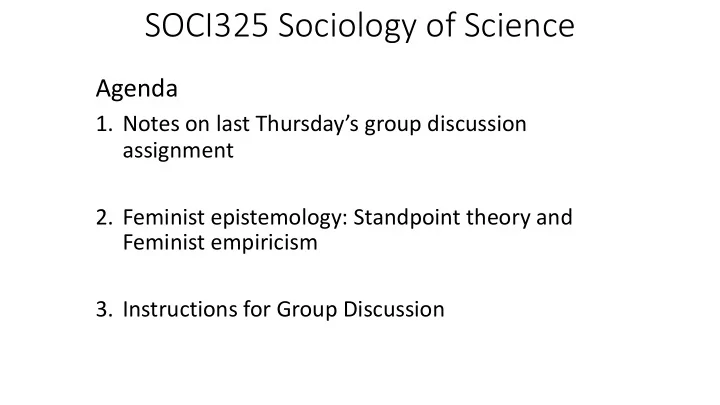

SOCI325 Sociology of Science Agenda 1. Notes on last Thursday’s group discussion assignment 2. Feminist epistemology: Standpoint theory and Feminist empiricism 3. Instructions for Group Discussion
General comments on Thursday’s group paper • Internal/External distinction • Bloor’s Impartiality vs. Merton’s disinterestedness • Scientific Realism • Bloor: Knowledge as collectively endorsed belief
Feminist epistemology Ø Feminism, Science, and Epistemology: What’s the connection? Ø Two broad rival theories in feminist epistemology • Feminist Standpoint Theory • Feminist Empiricism
Feminist standpoint theory Ø All knowledge fundamentally is situated and partial. There is no such thing as aperspectival knowledge. • This is standpoint theory’s response to the widespread recognition among feminists that the rejection of partial perspective in science is a mask for androcentric bias. • As activists, relativism is not acceptable. Objectivity as partial perspective. -> Problem: how do we still retain a sense of asymmetry (objective vs. biased, rational vs. irrational) necessary for feminist advocacy? Ø Feminist advocacy based on the thesis of epistemic advantage • “Thesis of epistemic advantage” – women are in a better position to know about the world then men, at least in certain areas of inquiry. • Marxist Roots (“standpoint” from György Lukács) • All contemporary arguments based on power relationships • The “Superset” argument
Feminist Empiricism Ø More limited claims about the situatedness of knowledge • Instead of responding to the “masking” problem by defining objectivity as essentially partial, FE seeks to save a non-partial notion of objectivity • Cross-community shared values and standards for rational communication. • Weber: value-freedom vs. value-neutrality. • Still, feminists empiricists do not shy away from criticizing some existing scientific norms usually considered universal as deceptively androcentric. Ø Feminist advocacy based on the complementarity between groups • Different perspectives come with biases & blind spots – when diverse groups openly communicate, science will become more capable of identifying its shortcomings. • The inclusion of women (or other minority groups) can help white-male dominated mainstream science identify its blind spots.
I’m not a feminist: why should I be interested? Ø The logic that sustains contemporary feminist epistemology has little to do with women or gender. It is about relationships of power. Ø Postcolonialism, Indigenous studies, Critical Race Theory ….
Discussion Small-group discussions: • Choose a new facilitator who will keep the discussion focused and make sure everyone is able to participate. • Choose a new secretary who will take notes and summarize the group’s responses for submission. • Download today’s discussion questions (Microsoft Word format) from the link on the syllabus. Make a copy and upload to MyCourses. https://soci325.netlify.com/discussion_questions/05.02.docx Notes: ⦙ Try to respond to (almost) all of the questions. ⦙ Avoid terse, bullet-point style. ⦙ Refer directly to the text. ⦙ Quality over quantity.
Next Class • Scientific Realism Required Reading: Hacking (1983), What is scientific realism?
Recommend
More recommend